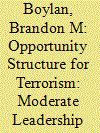| Srl | Item |
| 1 |
ID:
157858


|
|
|
|
|
| Summary/Abstract |
The Arctic Council is the primary forum for fostering cooperation and addressing concerns in the Arctic, yet few know of its work. The Model Arctic Council (MAC) is a simulation of the Arctic Council designed to address this awareness deficit. It places graduate and undergraduate students in roles as Arctic Council delegates, challenging them to collaborate to tackle the Arctic’s most pressing issues. This article explains the MAC initiative and the MAC 2016 event held at the University of Alaska Fairbanks (UAF). It evaluates participants’ qualitative comments and survey responses from the MAC 2016 and finds that the program was effective in developing student knowledge of the Arctic; increasing student understanding of Arctic Council objectives and processes; preparing students for leadership roles in the circumpolar north; and encouraging student-faculty collaboration among University of the Arctic (UArctic) institutions. To improve future MAC programs, the organizing committee should strengthen the pre- and early program training sessions, clarifying Arctic Council processes and norms and stressing effective communication skills and cultural sensitivity.
|
|
|
|
|
|
|
|
|
|
|
|
|
|
|
|
| 2 |
ID:
165694


|
|
|
|
|
| Summary/Abstract |
Why does terrorist violence escalate from some ethnic groups but not others? According to theoretical insights, many groups endure conditions that should spur on terrorist campaigns, but in reality only some carry them out. In contrast to studies emphasising motivations, this article constructs a framework centred on opportunity structures that contributes to our understanding of the rise of terrorism waged along ethnic lines. It argues that beyond grievances or other motivations, terrorist campaigns develop from communities when moderate political leaders depart from their positions in nationalist movements, causing terrorists to fill the subsequent power vacuum, while little terrorism occurs when leaders do not relinquish the nationalist agenda. This argument is evaluated with evidence from the Tamil and Muslim cases in the context of the Sri Lankan Civil War. Tamil United Liberation Front leaders left the Tamil nationalist movement in the early 1980s, enabling the Liberation Tigers of Tamil Eelam’s rise to dominate the nationalist agenda for three decades, while the Sri Lanka Muslim Congress did not relinquish the Muslim cause, which in part precluded the normalisation of violence in the community.
|
|
|
|
|
|
|
|
|
|
|
|
|
|
|
|